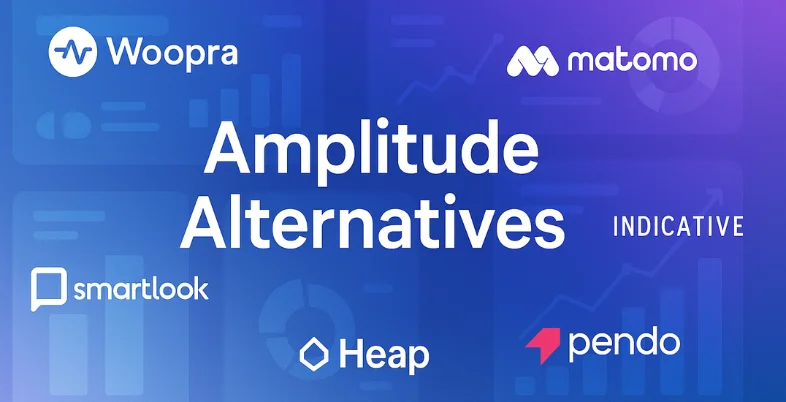With a compound annual growth rate (CAGR) of 21.3%, the global product analytics market is set to grow from $9.6 billion in 2021 to $25.3 billion by 2026. This surge has opened the door to more tools, giving teams plenty of choices to better understand user behavior and make smarter product decisions.
“Over 18,000 companies have started using Amplitude as their analytics tool,” highlighting its strong presence and widespread adoption across industries.
Still, Amplitude isn’t the perfect fit for everyone. Some teams find it costly to scale, others face a steep learning curve or want more control over their data, leading many to seek better-suited alternatives.
Whether you need simpler onboarding, flexible pricing, or privacy-first features, here are the top Amplitude alternatives to explore in 2025.
Reasons to Consider an Alternative to Amplitude
Before jumping into the list, let’s understand why you might want an alternative to Amplitude:
- Cost Becomes a Problem: Amplitude uses an event-based pricing model. As your user base grows and you start tracking more events, the cost can increase significantly, sometimes unpredictably. For startups or small businesses, this can be a deal-breaker.
- It’s Feature-Rich but Complex: Amplitude has many features, but not everyone needs all of them. Sometimes teams just want a simple way to see what users are doing and where they drop off without digging through a complicated UI.
- Need for More Flexibility: Some companies want tools they can self-host, others need deeper integrations with their own data warehouses or tech stacks. Amplitude may not offer the flexibility or control they need.
So if you’re looking for more affordable, simpler, or more flexible product analytics tools, here are the best alternatives you can consider in 2025.
List of Top 10 Amplitude Alternatives
1. Mixpanel
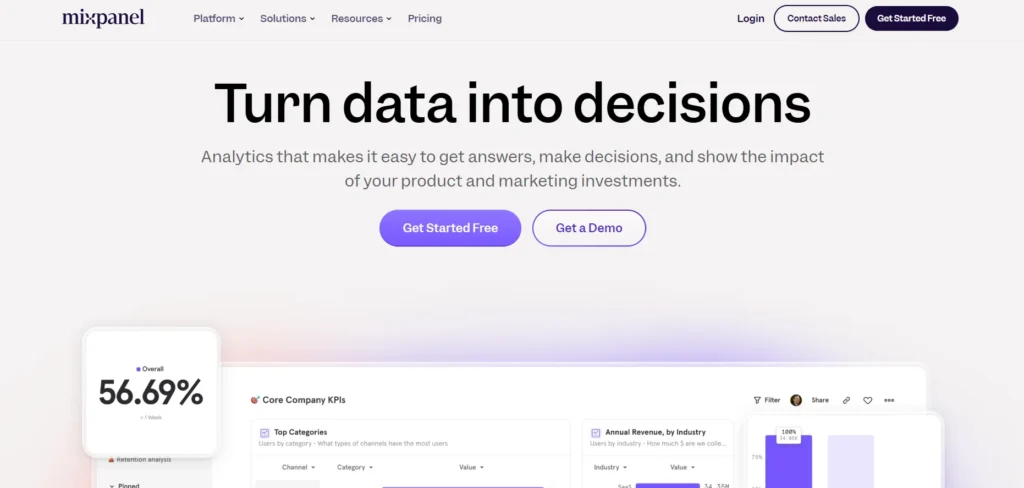
Website: https://mixpanel.com
Mixpanel is a user-friendly product analytics tool that enables teams to analyse customer behaviour in real time. Product and marketing teams may use it to monitor user behaviour and determine whether features encourage engagement or churn.
Mixpanel lets you create custom dashboards, track events, visualise funnels, and compare user groups. It is appropriate for both technical and non-technical users due to its user-friendly interface. Additionally, Mixpanel provides insights through retention statistics and predictive analytics. It works well for both mobile and online applications. Its performance and scalability make it a solid choice for growing businesses.
Key Features:
- Real-time event tracking
- Custom dashboards and funnels
- Cohort and retention analysis
- Predictive analytics and alerts
- A/B testing and user segmentation
- Integrations with data warehouses, CRMs, and more
Pricing:
- Free Plan – $0/month
- Growth Plan – Starts at $0 (pay-as-you-grow: $0.00028 per event after 1M events)
- Enterprise Plan – Custom pricing (Contact Sales)
- Startup Program – Free for first year (eligible startups)
2. PostHog
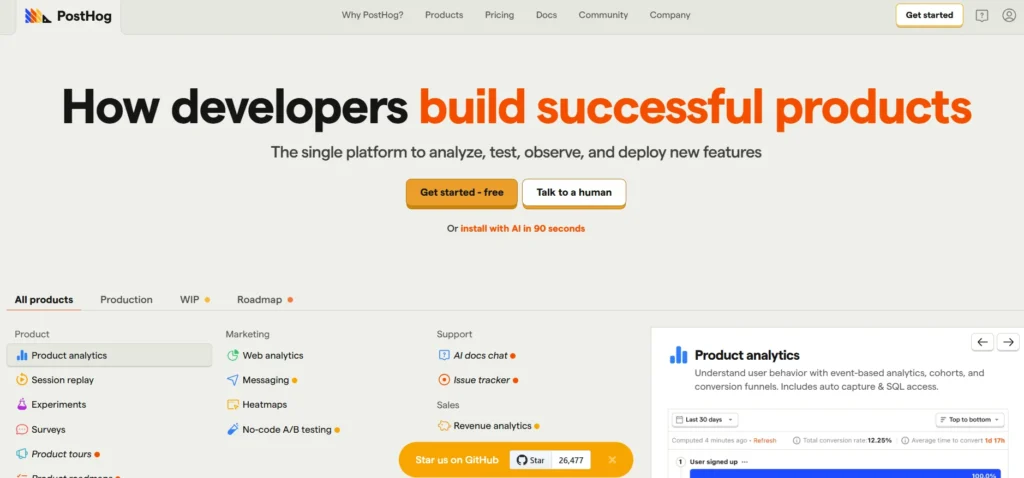
Website: https://posthog.com
PostHog is an open-source product analytics suite that gives you full ownership of your user data. It provides event monitoring, heatmaps, session replays, and feature flags all in one place. As one of the notable Amplitude alternatives, PostHog can be self-hosted, making it ideal for businesses that prioritize data privacy and security.
It’s highly customizable, which appeals to engineering teams. It can be used for A/B testing, tracking, and even creating unique plugins. It integrates easily with your existing development workflows. PostHog is built to scale with product-led teams that want flexibility.
Key Features:
- Self-hosting and cloud options
- Heatmaps and session recordings
- Feature flags and experimentation
- Event and funnel tracking
- Plugin support and API access
- GDPR and HIPAA compliance
Pricing:
- Free – $0/month
- Ridiculously Cheap – Starts at $0/month (usage-based)
- Starship Enterprise – From $2,000/month
3. Heap
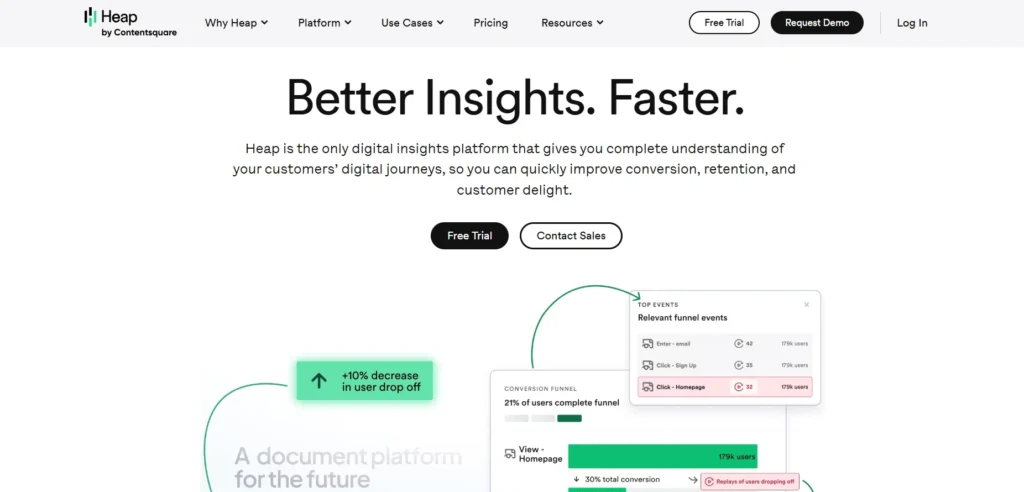
Website: https://heap.io
Heap is a no-code product analytics tool that automatically captures every user interaction on your app or website. You don’t need to tag events manually, which saves development time. Teams can retroactively analyze data and uncover insights without waiting on engineering.
Heap also supports funnels, session replays, retention reports, and user journey mapping. It’s particularly useful for fast-paced teams that iterate frequently. With AI-driven insights, Heap can also surface key user behaviors and drop-off points.
Key Features:
- Auto-capture of all user interactions
- No-code retroactive event analysis
- Session replays and heatmaps
- Funnels, retention, and journey analysis
- AI insights and recommendations
- Role-based dashboards
Pricing:
- Free plan available
- Growth – Pricing on request
- Pro – Custom pricing (contact sales)
- Premier – Custom pricing (contact sales)
4. Pendo
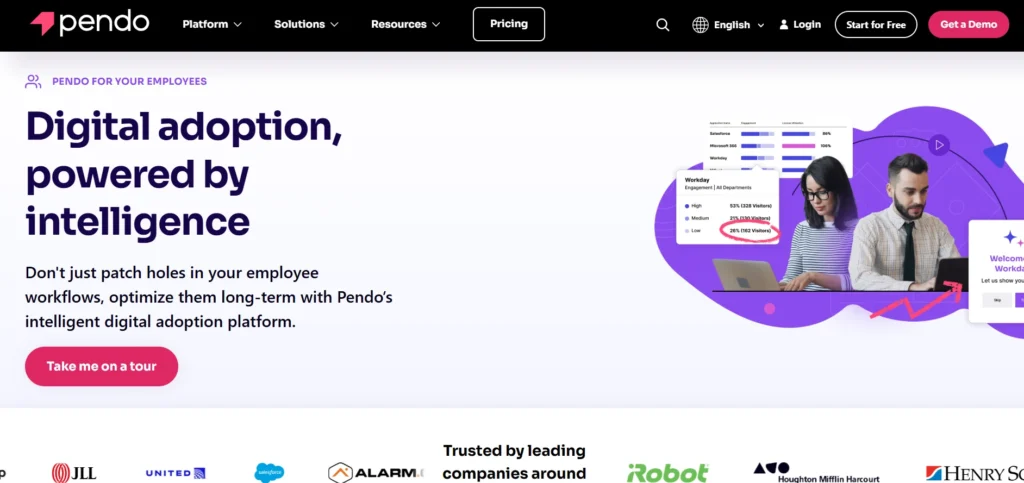
Website: https://www.pendo.io
Pendo is a complete product experience platform that combines product analytics with user feedback and in-app guidance tools. It helps teams understand user behavior, onboard users efficiently, and collect feedback through in-app surveys.
Pendo’s real strength lies in helping product teams drive feature adoption and reduce churn. It’s ideal for SaaS businesses looking to build better onboarding flows and monitor feature usage. Pendo also works well for teams looking to build in-app support without extra development.
Key Features:
- Product analytics and usage tracking
- In-app guides and tooltips
- Net Promoter Score (NPS) and surveys
- Feature usage heatmaps
- Multi-platform support (web, mobile, desktop)
- Integrations with CRM and helpdesk tools
Pricing:
- Free – Start now (free forever, up to 500 monthly active users)
- For Base, Core, Pulse, and Ultimate – Request pricing
Suggested Read:
5. Smartlook
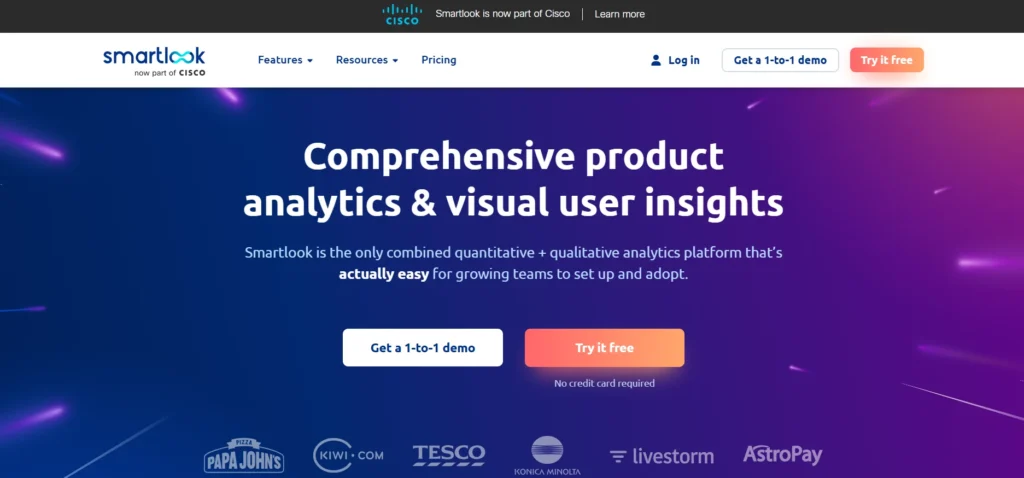
Website: https://www.smartlook.com
Smartlook offers visual product analytics with tools like session recordings, heatmaps, and event tracking. It provides a clear picture of how users behave on your website or app. Teams can filter session recordings to identify issues and optimize user journeys.
Smartlook is particularly helpful for UX designers and developers who want to improve user flow and understand drop-offs. It also works on both mobile and web platforms, making it versatile. Its simple interface and strong visual insights set it apart from traditional analytics platforms.
Key Features:
- Session recordings with filters
- Heatmaps for click, scroll, and movement
- Funnel and event tracking
- Cross-platform support (mobile + web)
- Retention and conversion tracking
- API and third-party integrations
Pricing:
- Free plan
- Pro plan – Starting at $55/month
- Enterprise Plan: Custom pricing
6. Adobe Analytics
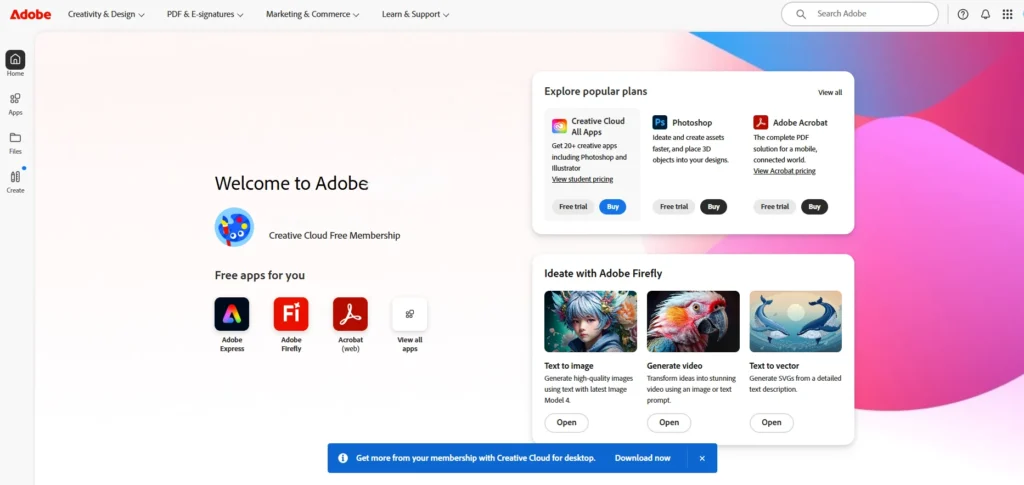
Website: www.adobe.com
Adobe Analytics is a powerful enterprise-level tool offering deep insights across web, mobile, and offline customer journeys. As one of the prominent Amplitude alternatives, it is part of Adobe Experience Cloud and enables advanced segmentation, real-time data visualization, and predictive analytics.
With AI and machine learning capabilities, it surfaces valuable trends and helps businesses forecast behavior. Adobe Analytics is ideal for large organizations needing multichannel and omnichannel analytics. However, its complexity and cost make it best suited for enterprise use.
Key Features:
- Real-time analytics and data visualization
- AI-driven predictive insights
- Advanced segmentation and cohort analysis
- Multichannel data tracking (web, app, offline)
- Integration with Adobe marketing tools
- Custom dashboards and alerts
Pricing:
- Select – Enterprise-grade marketing analytics (contact for pricing)
- Prime – Digital intelligence for the enterprise (contact for pricing)
- Ultimate – Digital intelligence for the experience enterprise (contact for pricing)
7. Indicative
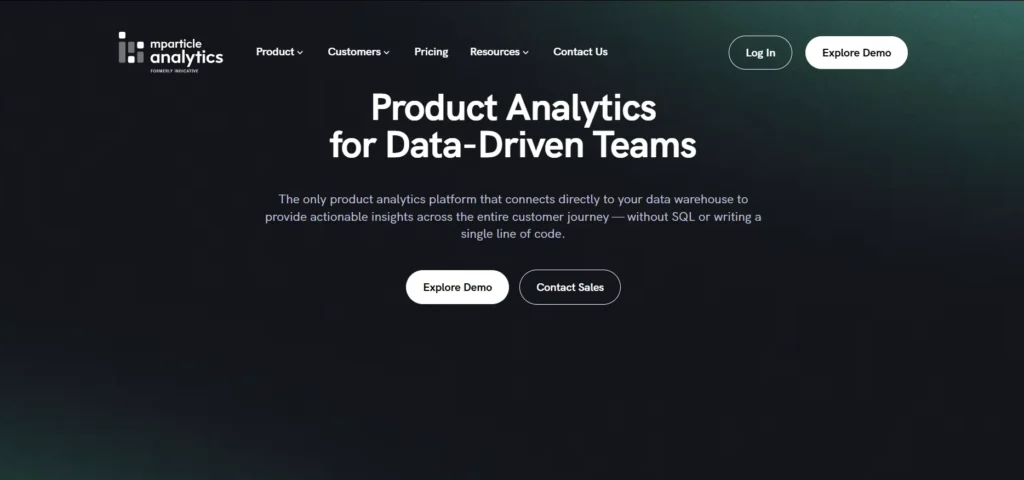
Website: https://www.indicative.com
Indicative helps product and growth teams analyze user behavior without needing to write SQL queries. It connects to your data warehouse and provides easy-to-use drag-and-drop tools for journey analysis, cohort comparisons, and funnel optimization.
Its intuitive interface is built for marketers and product managers. Indicative also offers real-time tracking and allows you to go deep into conversion metrics. It’s a great alternative for teams wanting fast, visual analytics without technical barriers.
Key Features:
- No-code user journey mapping
- Cohort analysis and funnel visualization
- Real-time segmentation
- Direct integration with data warehouses
- Cross-platform support
- Retroactive event filtering
Pricing:
- Pricing is customized based on your data usage and credits purchased
8. Kissmetrics
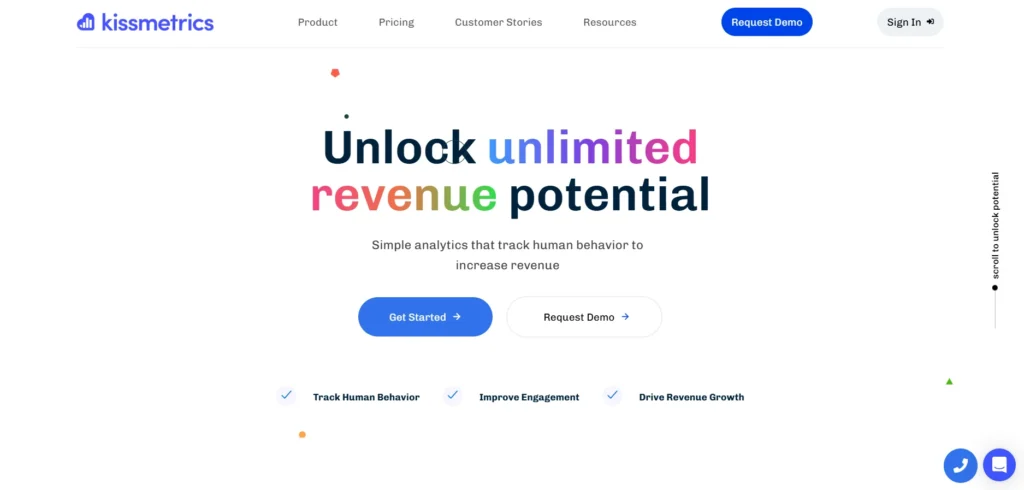
Website: https://www.kissmetrics.io
Kissmetrics is a product analytics and marketing performance tool built specifically for SaaS and eCommerce businesses. It serves as one of the Amplitude Alternatives, helping you track revenue, churn, conversions, and user behavior with a business-oriented focus.
Unlike generic analytics tools, Kissmetrics ties user actions to metrics like lifetime value and acquisition cost. It’s ideal for teams looking to connect product usage with revenue insights. The platform also supports funnel tracking, cohort analysis, and campaign performance monitoring.
Key Features:
- Revenue and conversion analytics
- Funnel and cohort tracking
- Customer segmentation and LTV analysis
- Email campaign tracking
- Data export and integration options
- Behavioral analysis tied to revenue metrics
Pricing:
- Flexible package options personalised to business needs on request.
9. Matomo
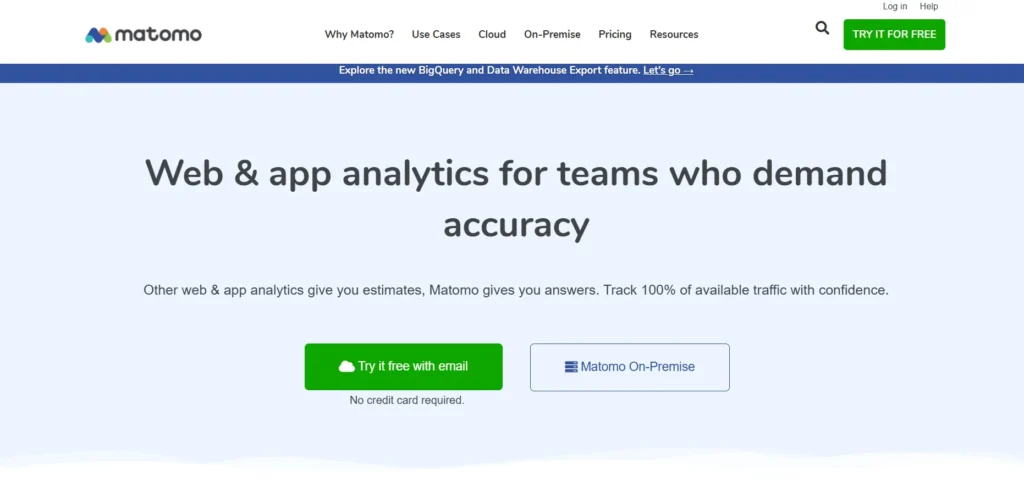
Website: https://matomo.org
Matomo is a privacy-focused, open-source alternative to Amplitude and Google Analytics. It gives you full control over your data and doesn’t share it with third parties. It includes event tracking, A/B testing, heatmaps, goal conversion, and session recording.
Matomo is perfect for organizations that must comply with strict data laws like GDPR and HIPAA. It can be self-hosted or used via Matomo Cloud. Its ethical data practices and complete ownership model make it a standout choice for privacy-first businesses.
Key Features:
- 100% data ownership
- GDPR, CCPA, and HIPAA compliant
- Heatmaps and session recordings
- A/B testing and funnel tracking
- Self-hosted and cloud versions available
- Integrations with CMS and eCommerce tools
Pricing:
- Cloud Plan: INR 1,690/month (for 50,000 hits)
- On-Premise Plan: Custom pricing.
10. Woopra
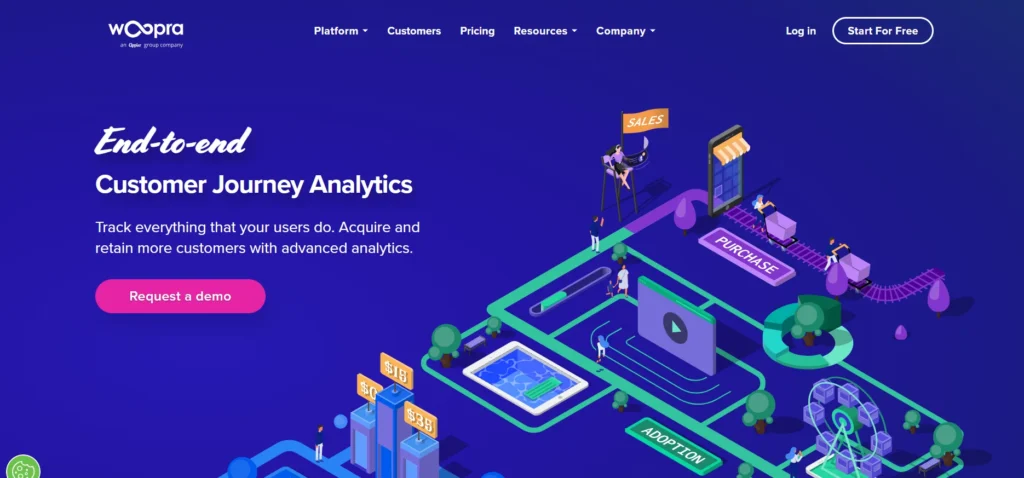
Website: https://www.woopra.com
Woopra focuses on tracking the complete customer journey across touchpoints like website, mobile, email, helpdesk, and CRM tools. It creates detailed user profiles and real-time analytics to help businesses improve customer retention and lifetime value.
With over 50 integrations, it connects smoothly with tools like HubSpot, Salesforce, Intercom, and Zendesk. Woopra is ideal for customer-centric teams looking to tie product behavior to lifecycle metrics and business outcomes.
Key Features:
- Customer journey and lifecycle tracking
- Real-time segmentation and analytics
- CRM and helpdesk integrations
- Funnel, retention, and custom reports
- User timeline and behavior mapping
- Automation and triggers
Pricing:
- Core – Free
- Starter – $49+ / month
- Pro – $999+ / month
- Enterprise – Contact for pricing
Conclusion
Finding a less expensive tool isn’t the only reason to leave Amplitude; you also need to pick a platform that suits your objectives, team size, and process. When exploring Amplitude Alternatives, consider that some systems, like PostHog or Matomo, provide greater flexibility and privacy, while others, like Heap and Mixpanel, are simple to use and quick to deploy.
Before choosing, try out a number of these platforms’ free levels or trials. You may enhance user experience, make better product decisions, and scale your organisation more intelligently with the aid of the appropriate analytics solution.
FAQs
1. What is the best alternative to Amplitude for startups?
Mixpanel or PostHog are ideal for startups due to their free plans and flexible setups.
2. Is there a free alternative to Amplitude?
Yes. Mixpanel, PostHog (self-hosted), Heap, and Smartlook offer solid free plans.
3. Which tool is better: Amplitude or Mixpanel?
Mixpanel is easier to use and better for real-time needs. Amplitude offers more advanced behavioral analysis.
4. Which Amplitude alternative offers the best data privacy?
PostHog and Matomo are the best privacy-first alternatives, offering full data control and self-hosting options.
